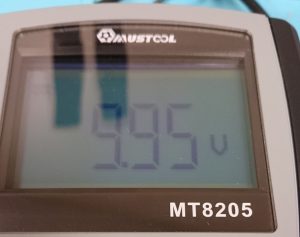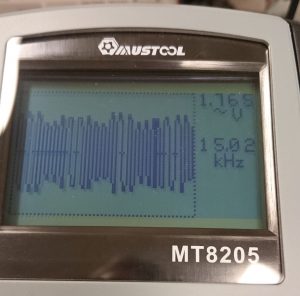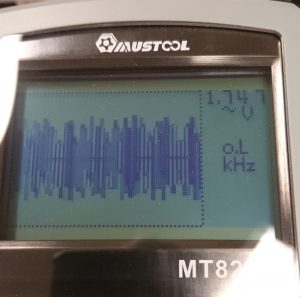I’m always looking for bargain test equipment, and sometimes I get burnt; hopefully this review saves you from wasting some time and money.
I bought the Mustool MT8205 from Banggood who advertise it as a “2 in 1 Digital Intelligent Handheld Storage Oscilloscope Multimeter AC/DC Current Voltage Resistance Frequency Diode Tester”; it sells for just under $50 shipped. I love Banggood and have had lots of good experiences with them, but buyer beware: this product is a waste of money at any price. (Update: Although this product is something to avoid, Banggood is wonderful and I highly recommend them. They took this product back at their cost just because I was unhappy with it…now that’s great customer service!)

Mustool MT8205
While it looks good, feels solid, and comes with nice probes and case, it simply isn’t useful for making measurements as my tests below will show.
Let’s start with how it works as an oscilloscope since that’s the interesting feature of this device. When I ordered it, the ad said 200ksps which would suggest it is useful to look at signals up to at least 20kHz…not great, but at good enough for looking at audio and PWM waveforms. However, as the ad now says, the analog bandwidth is limited to 10kHz. A 15kHz signal is severely distorted and it won’t even try 20kHz. A 10kHz ramp looks just like a 10kHz sinewave. See the pictures below where I feed it a 15kHz sinewave and a 20kHz sinewave from a Rigol signal generator showing that the bandwidth is indeed limited to 10kHz (i.e. useless). There are other issues too: there is no trigger control, the signal is always AC-coupled (so you can’t measure anything DC), there are none of the controls you’d expect to find on an oscilloscope and it’s too slow for virtually anything these days. The scope feature is a complete bust.
To add insult to injury, the multimeter functionality is useless too! The readout is only 3 digits and even those aren’t accurate! I hooked the meter up to a lab voltage standard and checked the output with a calibrated 7-digit HP bench meter. The 10.0000V standard was dead on with the HP meter, but read 9.95v on the Mustool. What’s worse, when I used it to measure 2.5v and then used it to measure 10v again, it took several (I’m talking 4-5) seconds for the readout to gradually climb to 9.95. Useless.
Summary:
- Large/heavy/manual-ranging multimeter
- Only 3 digits, only 2 of which are accurate (see 10vdc lab standard)
- Incredibly slow: takes several seconds for voltage to read properly
- Limited to 10kHz analog bandwidth
- AC coupled only
- Oscilloscope has no controls so not even useful as a teaching tool

10VDC from Lab Standard

15kHz sinewave

20kHz sinewave
